AC Repair Eastbourne
Find the best Air Conditioner Repair in Eastbourne
Receive multiple AC Repair quotes for your project today! Compare profiles, reviews, accreditations, portfolio, etc... and choose the best deal.

Jigsaw Energy
52 reviewsHastings, GBJigsaw Energy Ltd is a company based in Sussex, specialising in energy efficient heating and cooling systems for domestic, commercial and retail sectors, as well as creating Smart Home systems. With over 25 years of experience, a licensed and skilled team, and a commitment to excellence, Jigsaw Energy provides fully tailored solutions for their clients. Their services include Home Automation, Air Conditioning, Renewable Energy, and Heating Systems. The company prides itself on its ability to deliver bespoke services for home, business, and retail, and has received positive reviews from satisfied clients.
- Services
- Why Us?
- Testimonials
- Gallery
Get Quote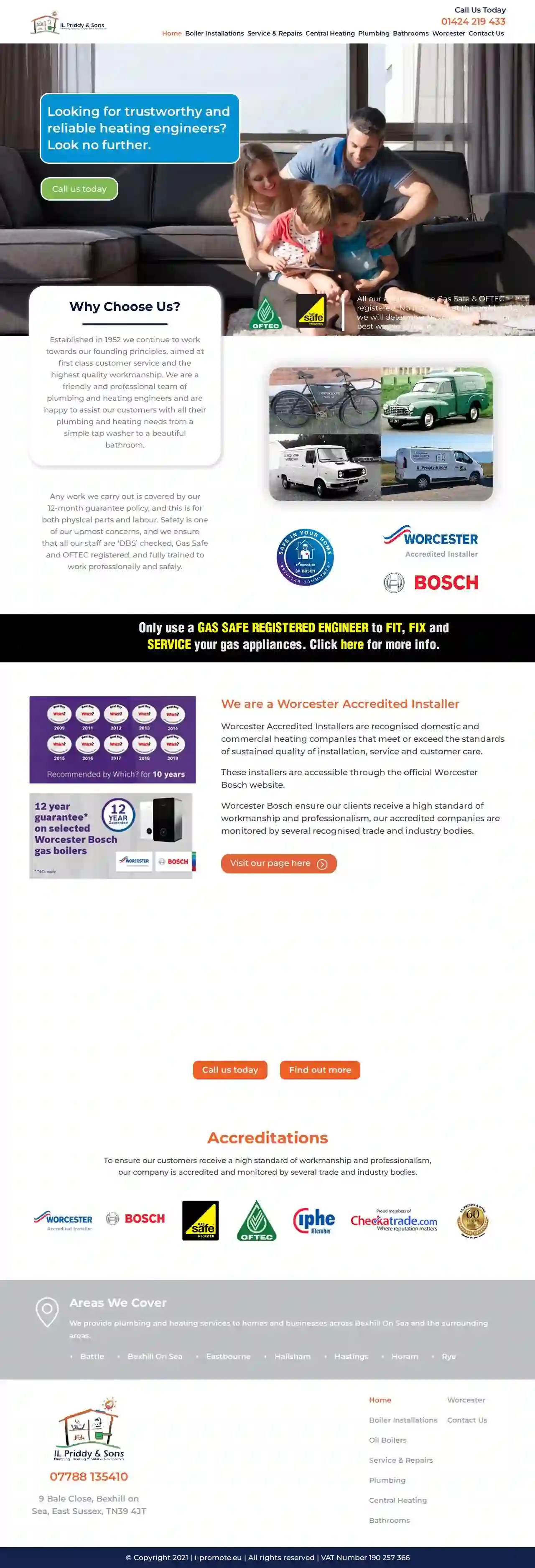
I L Priddy & Sons
3.811 reviews9 Bale Close, Bexhill on Sea, TN39 4JT, GBLooking for trustworthy and reliable heating engineers? Look no further. Call us today. All our engineers are Gas Safe & OFTEC registered. No matter what the problem is, we will determine the cause and find the best way to repair it. Why Choose Us? Established in 1952 we continue to work towards our founding principles, aimed at first class customer service and the highest quality workmanship. We are a friendly and professional team of plumbing and heating engineers and are happy to assist our customers with all their plumbing and heating needs from a simple tap washer to a beautiful bathroom. Any work we carry out is covered by our 12-month guarantee policy, and this is for both physical parts and labour. Safety is one of our upmost concerns, and we ensure that all our staff are ‘DBS’ checked, Gas Safe and OFTEC registered, and fully trained to work professionally and safely. Only use a GAS SAFE REGISTERED ENGINEER to FIT, FIX and SERVICE your gas appliances. Click here for more info. We are a Worcester Accredited Installer Worcester Accredited Installers are recognised domestic and commercial heating companies that meet or exceed the standards of sustained quality of installation, service and customer care.These installers are accessible through the official Worcester Bosch website. Worcester Bosch ensure our clients receive a high standard of workmanship and professionalism, our accredited companies are monitored by several recognised trade and industry bodies. Visit our page here We offer you the highest quality workmanship and services Our Services Include: Bathroom Refurbishments Burst Pipes Central Heating Installations Emergency Plumbers Energy Efficient Advice Gas Boiler Installations Gas Boiler Repairs Gas Boiler Breakdowns Gas Cookers & Hobs Gas Safety Inspections General Plumbing Immersion Tanks Landlord Safety Certificates Powerflushing Replacements and Repairs Replacement Radiators Solar Hot Water Underfloor Heating Call us today Find out more Accreditations To ensure our customers receive a high standard of workmanship and professionalism, our company is accredited and monitored by several trade and industry bodies. Areas We Cover We provide plumbing and heating services to homes and businesses across Bexhill On Sea and the surrounding areas. Battle Bexhill On Sea Eastbourne Hailsham Hastings Horam Rye
- Services
- Why Us?
- Accreditations
- Gallery
Get Quote
DC Heating Solutions
587 reviewsUckfield, GBWelcome to DC Heating Solutions, a family run business offering high quality plumbing, gas and LPG services throughout Uckfield. We pride ourselves on providing a friendly, reliable and trustworthy Plumbing and Heating service, from dripping taps to full central heating installations and everything in-between. Covering LPG and Gas installations. Whether it’s a boiler breakdown, landlord gas safety check, installations, maintenance, service or just some advice. We are fully qualified, gas safe registered and insured, with over 10 years experience in the industry. We are a family run business based in Uckfield and offers high quality plumbing, gas and LPG services to households in Uckfield, Crowborough, Heathfield, Eastbourne, Hailsham, Tunbridge Wells and surrounding villages including East Hoathly, Newick, High Hurstwood, Nutley, Isfield, Mayfield, Cross-In-Hand and Halland.
- Services
- Why Us?
- Accreditations
- Our Team
- Testimonials
- Gallery
Get Quote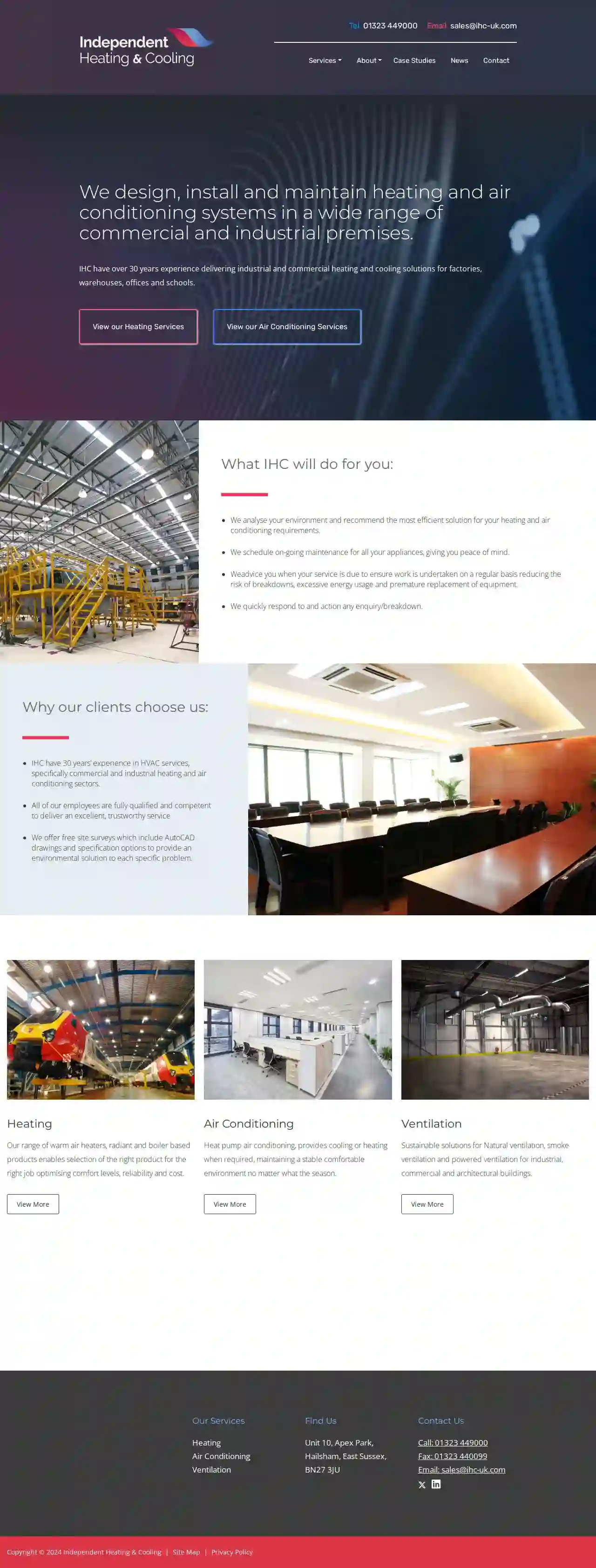
Independent Heating & Cooling
51 reviewsUnit 10, Apex Park, Hailsham, BN27 3JU, GBIndependent Heating & Cooling (IHC) is a company with over 30 years of experience providing heating and air conditioning solutions for commercial and industrial clients. They specialize in designing, installing, and maintaining a wide range of systems, including warm air heaters, radiant heating, boilers, air curtains, heat pump air conditioning, and various ventilation systems. IHC serves a variety of sectors such as factories, warehouses, offices, and schools. IHC prides itself on its team of fully qualified and competent employees who deliver a trustworthy service. They offer free site surveys with AutoCAD drawings and specification options to ensure each client receives a tailored environmental solution.
- Services
- Why Us?
- Gallery
Get Quote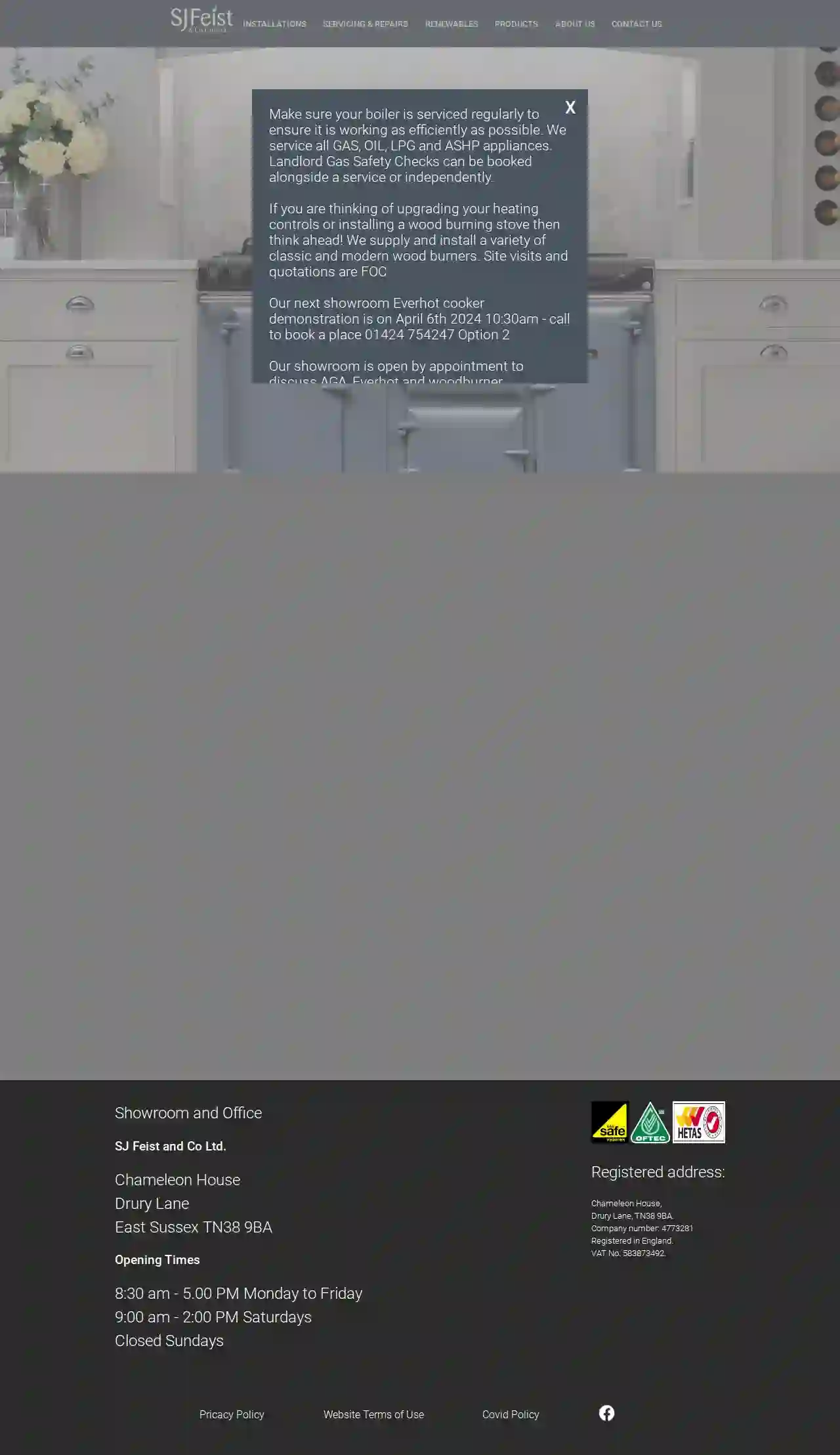
SJ Feist and Co Ltd Heating & Plumbing Engineers
4.847 reviewsHastings, GBSJ Feist are experts in Plumbing and heating and cover the Sussex and Kent area. We also specialise in renewable energy. Please call us on: 01424 754 247
- Services
- Why Us?
Get Quote
G Tech Building Services
41 reviewsUnit 8a, Connors Yard, Beeches Rd, Crowborough, TN6 2AH, GBG Tech Building Services has always operated under strong values aimed at exceeding clients needs. Our relationship with our clients begins on the first day of contact and only ends once they’re fully satisfied with our work.Established in 2006 by Director/Owner Gary Stone, specialising in commercial and industrial mechanical services.With over 35 years’ experience gained specifically within the building services industry, we can provide a professional and cost-effective solution to any design challenge. Our comprehensive range of services can be tailored to meet your specific requirements and we will ensure that you are utilising the latest energy efficient building services technology available. From either pre-designed schemes or our own in-house design team, we can offer a fully managed installation package with attention to current codes of good practice.
- Services
- Why Us?
- Our Team
- Gallery
Get Quote- Ce
Central Sussex Construction And Electrical Ltd
54 reviewsHastings, GB- Services
- Why Us?
Get Quote 
Roselands Heating
3.914 reviewsUnit C1, Chaucer Business Park, Polegate, BN26 6QH, GBRoselands Heating has been providing a broad portfolio of commercial heating services since 1972. Our team of experienced Sussex-based commercial heating engineers is Gas Safe and OFTEC registered, ensuring that we can work on traditional gas- and oil-fired boilers safely and professionally. We’re familiar with a wide range of heating options, including renewable technologies, and will take the time to understand your requirements and suggest a solution that is the best possible fit. We’re confident in the quality of our work and, as a result, we offer our services on a flexible basis without the need for an ongoing contract. This allows our customers to just pay for the work that they need. Nonetheless, we understand the value of building long-term partnerships with our customers and this is our preferred approach. By providing convenient, high-quality commercial heating services, we believe that our customers will want to work with us again in future.
- Services
- Why Us?
- Gallery
Get Quote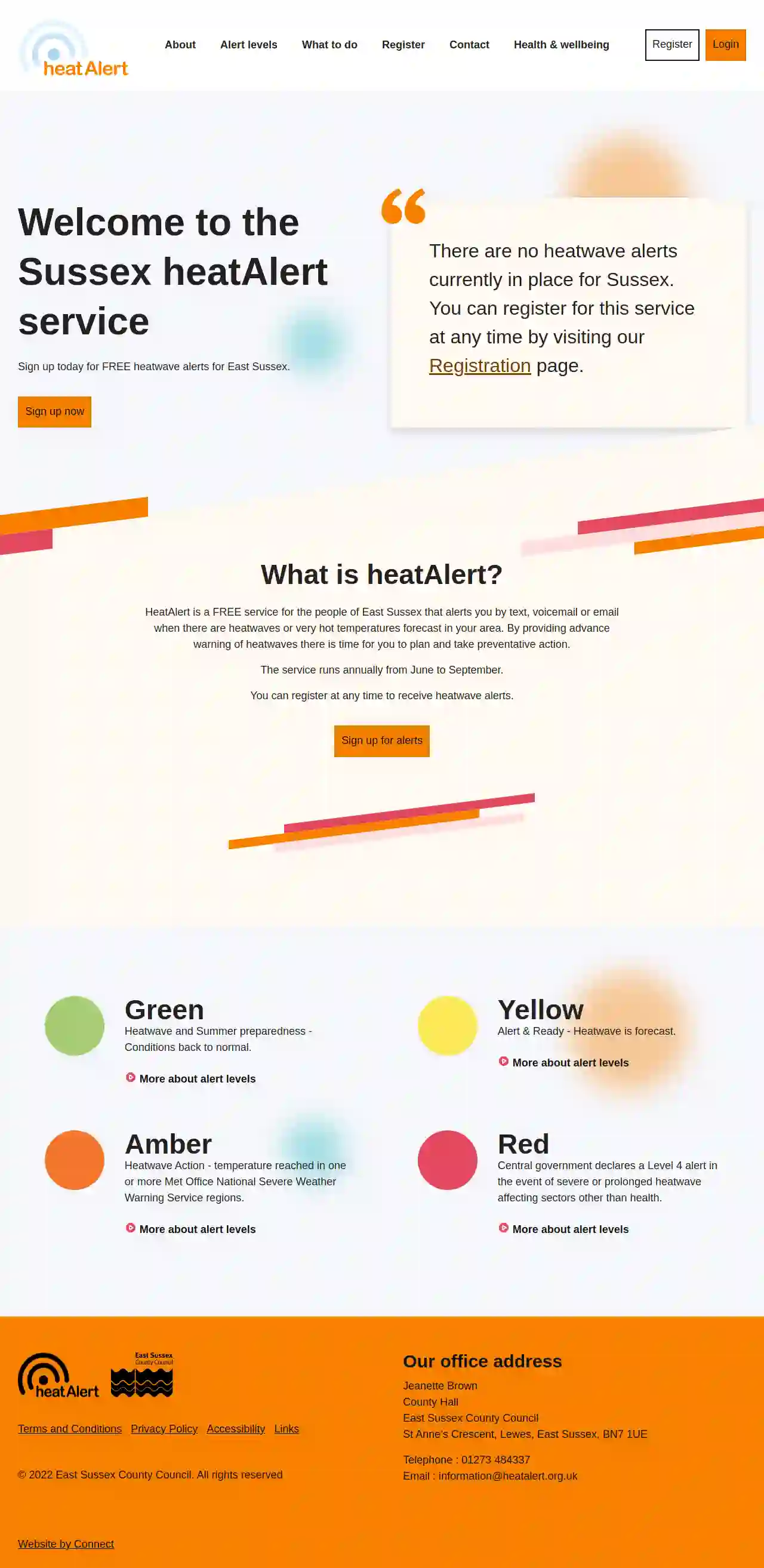
Heat Alert
1County Hall, St Anne’s Crescent, Lewes, BN7 1UE, GBWelcome to the Sussex heatAlert service. Sign up today for FREE heatwave alerts for East Sussex. The service runs annually from June to September. You can register at any time to receive heatwave alerts. The heatAlert service is a FREE service for the people of East Sussex that alerts you by text, voicemail or email when there are heatwaves or very hot temperatures forecast in your area. By providing advance warning of heatwaves there is time for you to plan and take preventative action.
- Services
- Why Us?
- Our Team
- Gallery
Get Quote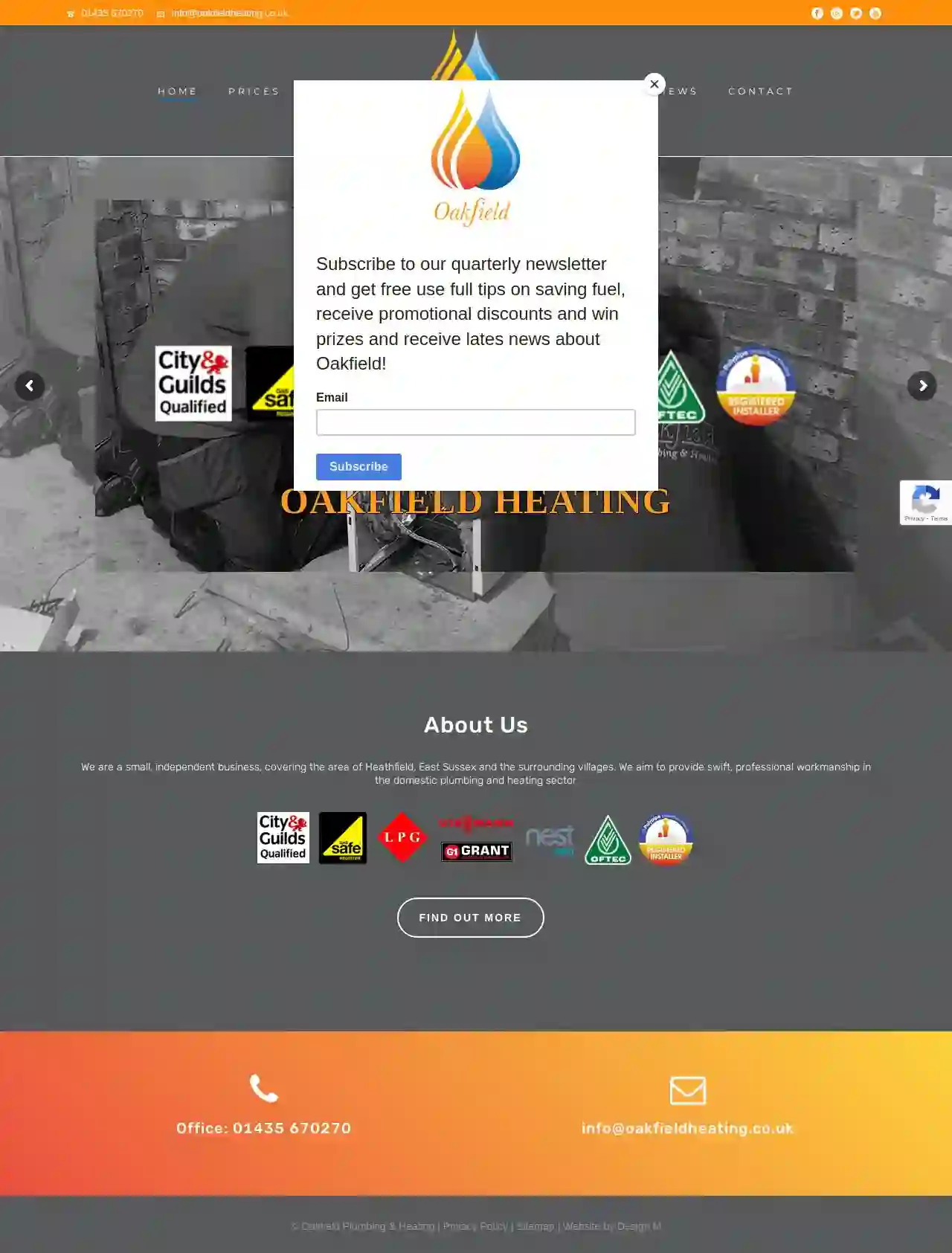
Oakfield Heating
536 reviewsHastings, GBOakfield Plumbing & Heating is a small, independent business covering the area of Heathfield, East Sussex and the surrounding villages. We aim to provide swift, professional workmanship in the domestic plumbing and heating sector. Our team consists of experienced engineers, including Sebastian Hodnett, Managing Director and Gas and LPG Engineer, Daniel Reed, Director and Gas and Oil Engineer, and Kathryn Hollands, Office Manager. We pride ourselves on providing quality craftsmanship, friendly and highly trained engineers, and superior product knowledge to ensure reliable and efficient plumbing and heating systems.
- Services
- Why Us?
- Our Team
- Gallery
Get Quote
Over 16,895+ HVAC Contractors on our directory
Our HVAC companies operate in Eastbourne and surrounding areas!
HVACCompaniesHub has curated and vetted the Best HVAC Contractors in and around Eastbourne. Find a top & reliable contractor today.
Frequently Asked Questions About AC Repair
- Refrigerant Leaks: Low refrigerant levels reduce cooling capacity and can damage the compressor. Signs include warm air, ice on lines, and hissing sounds.
- Frozen Evaporator Coil: Restricted airflow (often from a dirty air filter) can cause ice to form on the coil, hindering cooling.
- Dirty Air Filters: A clogged filter restricts airflow, reducing efficiency and potentially causing other problems.
- Faulty Capacitor: The capacitor helps start the motor. A bad capacitor can prevent the AC from turning on or cause intermittent operation.
- Compressor Problems: The compressor is the heart of the system. Issues here are serious and often require professional repair or replacement. Look for unusual noises, reduced cooling, or frequent cycling.
- Thermostat Malfunctions: An inaccurate or unresponsive thermostat can lead to inefficient cooling or prevent the system from turning on/off properly.
- Clogged Condensate Drain Line: The drain line removes condensation. If blocked, it can cause water leaks or damage to the system.
- Regular maintenance: Schedule professional tune-ups at least once a year to optimize performance.
- Programmable thermostat: Automate temperature adjustments based on your schedule.
- Seal air leaks: Caulk and weatherstrip windows and doors to reduce drafts.
- Proper insulation: Ensure adequate insulation to minimize heat transfer.
- Ventilation: Improve ventilation to remove excess heat and humidity.
- Energy-efficient appliances: Choose appliances with the Energy Star label to reduce overall energy load.
- HVAC zoning: Consider zoning to independently cool different areas.
Can a dirty air filter cause my AC to freeze up?
What is a condenser coil, and what role does it play in my AC unit?
What are the most common AC problems?
How can I improve my AC's energy efficiency?
Can a dirty air filter cause my AC to freeze up?
What is a condenser coil, and what role does it play in my AC unit?
What are the most common AC problems?
- Refrigerant Leaks: Low refrigerant levels reduce cooling capacity and can damage the compressor. Signs include warm air, ice on lines, and hissing sounds.
- Frozen Evaporator Coil: Restricted airflow (often from a dirty air filter) can cause ice to form on the coil, hindering cooling.
- Dirty Air Filters: A clogged filter restricts airflow, reducing efficiency and potentially causing other problems.
- Faulty Capacitor: The capacitor helps start the motor. A bad capacitor can prevent the AC from turning on or cause intermittent operation.
- Compressor Problems: The compressor is the heart of the system. Issues here are serious and often require professional repair or replacement. Look for unusual noises, reduced cooling, or frequent cycling.
- Thermostat Malfunctions: An inaccurate or unresponsive thermostat can lead to inefficient cooling or prevent the system from turning on/off properly.
- Clogged Condensate Drain Line: The drain line removes condensation. If blocked, it can cause water leaks or damage to the system.
How can I improve my AC's energy efficiency?
- Regular maintenance: Schedule professional tune-ups annually to optimize performance.
- Programmable thermostat: Automate temperature adjustments to save energy when you're away or asleep.
- Seal air leaks: Caulk and weatherstrip windows and doors to reduce drafts.
- Proper insulation: Ensure adequate attic, wall, and floor insulation to minimize heat transfer.
- Ventilation: Improve ventilation to remove excess heat and humidity.
- Energy-efficient appliances: Choose appliances with the Energy Star label to reduce overall energy load.
- HVAC zoning: Consider zoning to better regulate temperature different areas.